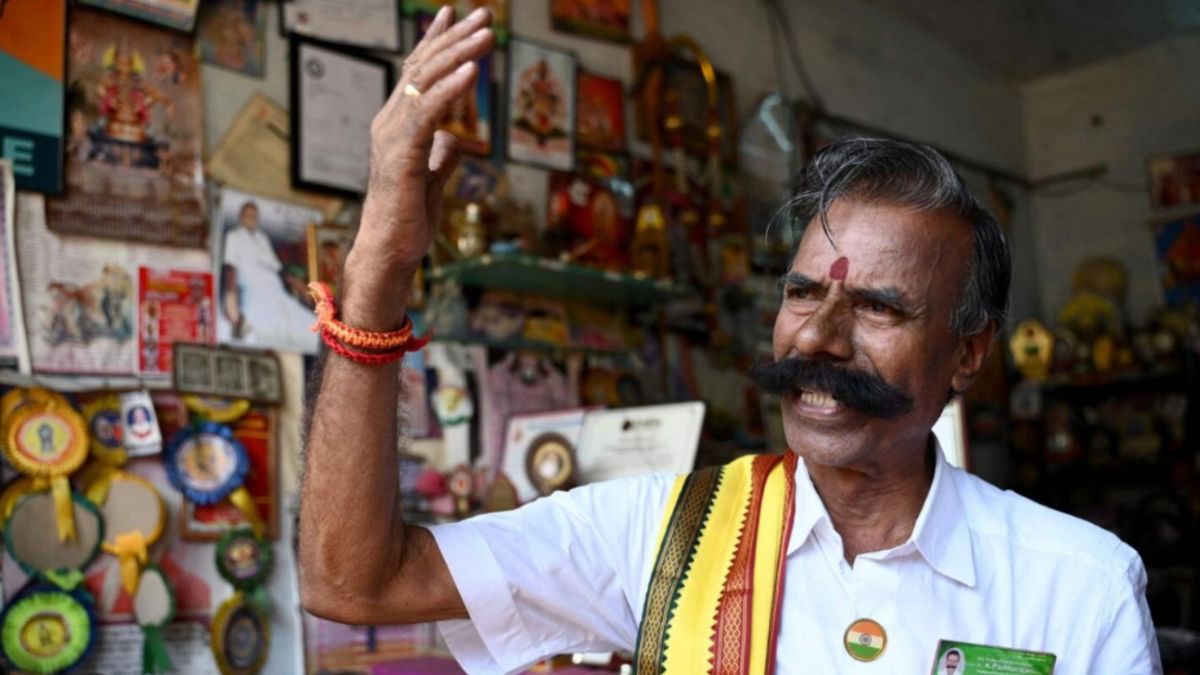Failure and success are states of mind, they say. The adage has become the life philosophy of K Padmarajan, the man who has lost at least 238 elections and is now preparing for yet another electoral battle in Tamil Nadu’s Dharmapuri district. His journey as a candidate began in 1988.
Padmarajan’s motivation isn’t victory but participation itself. He sees each election as an opportunity to prove that an ordinary citizen can engage in the democratic process. Over the years, he’s faced formidable opponents like Prime Minister Narendra Modi and former leaders Atal Bihari Vajpayee and Manmohan Singh, often with a sense of humour and acceptance of defeat.
While some may view his electoral stints as a series of losses, Padmarajan sees success in his resilience. Here’s his story.
‘Election King’
K Padmarajan, a tyre repair shop owner living in Mettur, Tamil Nadu, surprised many when he decided to enter the political arena. Despite initial scepticism and being mocked, he resolved to show the world that politics is for all.
“All candidates seek victory in elections,” said Padmarajan, sporting a bright shawl draped over his shoulder and an imposing walrus moustache. “But not me.”
Padmarajan is content in simply taking part, even if defeat is inevitable.
In the upcoming general elections, which begin on 19 April, he is contesting a parliamentary seat in Tamil Nadu’s Dharmapuri district.
Popularly dubbed the “Election King,” Padmarajan has competed from across the country in various elections, ranging from presidential to local polls. He has lost to some famous names: PM Modi, Vajpayee, Dr Singh, and Congress scion Rahul Gandhi.
Impact Shorts
More Shorts‘It is about involvement’
“Victory is secondary,” he said. “Who is the opposite candidate? I do not care.”
Padmarajan’s main preoccupation now is extending his losing streak. His eyes are set on another goal – to earn a place as India’s most unsuccessful candidate in the Limca Book of Records, an archive of records held by Indians.
But fighting elections has not come cheap — he estimates he has spent thousands of rupees in more than three decades in nomination fees. That includes a security deposit of Rs 25,000 for his latest tilt, which will not be refunded unless he wins more than 16 per cent of the vote.
Padmarajan’s best performance was in 2011 when he stood for the Assembly elections in Mettur. He won 6,273 votes compared to more than 75,000 for the eventual victor. “I did not even expect one vote,” he said. “But it showed that people are accepting me.”
In addition to his tyre repair shop, Padmarajan provides homoeopathic remedies and works as an editor for local media. But among all his jobs, fighting elections was the most important, he said.
“It is about involvement,” he said. “People hesitate to put in their nominations. So, I want to be a role model, to create awareness.”
‘Failure is best’
Padmarajan maintains detailed records of the nomination papers and identity cards from each of his failed bids for statesmanship, all laminated for safekeeping.
Each bears the multitude of campaign symbols he has used; a fish, ring, hat, telephone and, this time, tyres.
Years of fighting elections have paid off.
Once the subject of ridicule, Padmarajan is now asked to address students about resilience, using his campaigns to explain how to bounce back from defeat. “I do not think of winning — failure is best,” he said. “If we are in that frame of mind, we do not get stressed.”
Padmarajan has faith in democracy. He said it was important, now more than ever, that every citizen of the country exercise their franchise. “It is their right, they should cast their votes, in that respect there is no winning or losing,” he said.
He is not the one to give up. He said that he would continue to fight elections until his last breath but would be shocked were he ever to win. “I will have a heart attack,” he laughed.
With inputs from AFP


)

)
)
)
)
)
)
)
)



